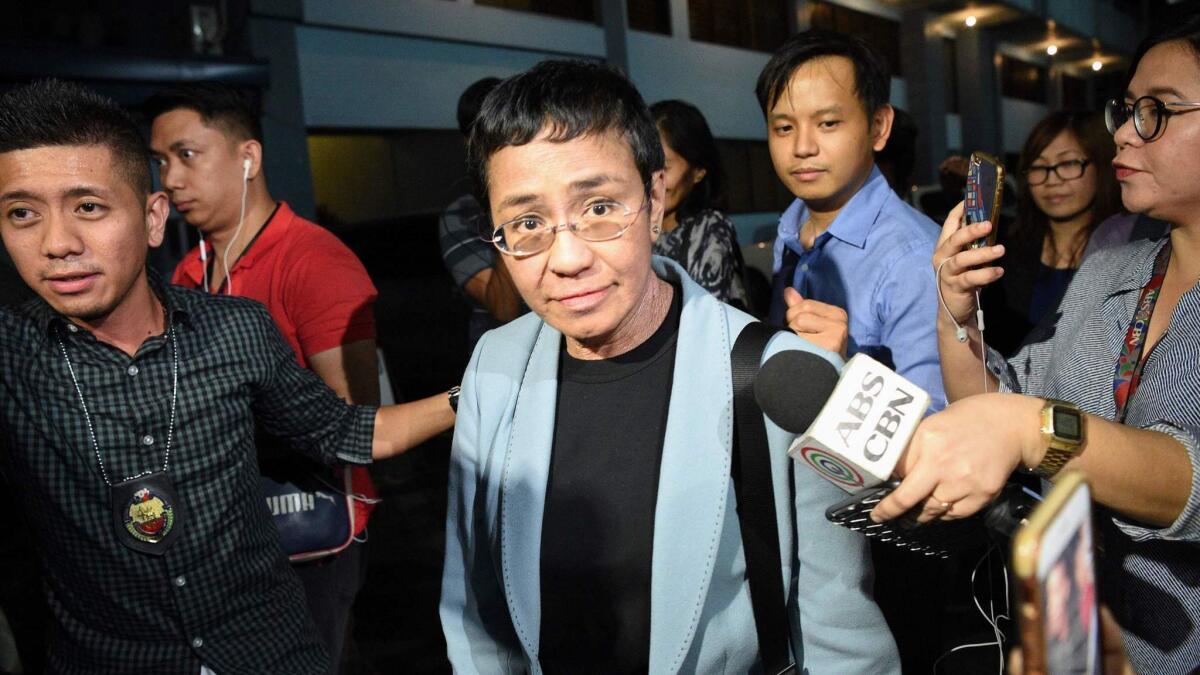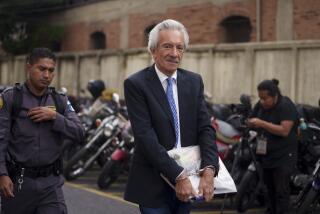Prominent journalist Maria Ressa, a Duterte critic, faces new charges in the Philippines

Reporting from Singapore — Maria Ressa, a veteran Philippine journalist and frequent target of the country’s president, was arrested Wednesday and charged with cyber libel.
Ressa, who garnered international recognition last year when she was among several reporters named Time magazine’s Person of the Year, was already facing charges of tax evasion in what critics said was an attempt to stifle critical reporting of President Rodrigo Duterte.
Ressa, the chief executive and executive editor of the news site Rappler, was arrested at the news outlet’s Manila headquarters by plainclothes officers from the National Bureau of Investigation, the news site reported. Authorities also charged former Rappler researcher Reynaldo Santos Jr.
The libel charge stems from a story published in May 2012, more than four months before the law Ressa and Santos are accused of violating was enacted.
The story, which was about an impeached chief justice, included details about businessman Wilfredo D. Keng, who filed the libel complaint for being described as having links to human trafficking and illicit drugs.
It was unclear late Wednesday whether Ressa would be permitted to post bail, as she did in December after being charged with tax evasion.
“We are not intimidated. No amount of legal cases, black propaganda and lies can silence Filipino journalists who continue to hold the line,” Ressa said in a statement. “These legal acrobatics show how far the government will go to silence journalists, including the pettiness of forcing me to spend the night in jail.”
The National Bureau of Investigation could not be reached for comment.
The crime of cyber libel was introduced as part of a controversial law aimed at primarily stamping out online fraud and child pornography, but which critics said was fashioned to control dissent against the government on the internet. Conviction of cyber libel can result in up to 12 years in prison.
Presidential spokesman Salvador Panelo said on national television that Ressa’s arrest was in accordance with the law.
“There’s nothing to do with freedom of expression or freedom of the press,” he said.
Still, the arrest drew immediate condemnation from free press advocates.
“The Philippine government’s legal harassment of Rappler and Ressa has now reached a critical and alarming juncture,” Shawn Crispin, the Committee to Project Journalists’ senior Southeast Asia representative, said in a statement. “We call on Filipino authorities to immediately release Ressa, drop this spurious cyber libel charge, and cease and desist this campaign of intimidation aimed at silencing Rappler.”
Rappler is credited with dogged reporting on Duterte’s so-called war on drugs, which has resulted in the deaths of thousands of mostly poor Filipinos.
Ressa is the recipient of last year’s Knight International Journalism Award and the Committee to Protect Journalists’ Gwen Ifill Press Freedom Award.
In the Philippines, however, her site is treated as a pariah by the Duterte administration and its supporters. Rappler’s reporters have been barred from covering presidential events and are the frequent subject of death threats.
The Manila-based Center for Media Freedom and Responsibility says conditions have deteriorated for journalists under Duterte’s presidency, in which charges of spreading “fake news” have been leveled at independent reporting. Twelve reporters have been killed since Duterte took power in 2016, the group said.
“Everyone who values press freedom and free expression needs to call President Rodrigo Duterte to account for this latest and most brazen assault on the very values that make possible the building of a free society,” the center said in response to Ressa’s arrest.
[email protected] | Follow me @dhpierson
More to Read
Sign up for Essential California
The most important California stories and recommendations in your inbox every morning.
You may occasionally receive promotional content from the Los Angeles Times.











